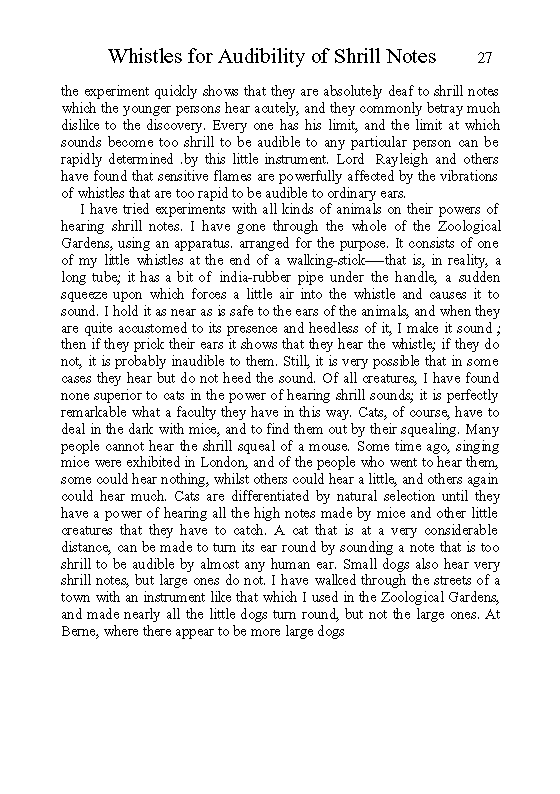Whistles for Audibility of Shrill Notes 27
the experiment quickly shows that they are absolutely deaf to shrill notes which the younger persons hear acutely, and they commonly betray much dislike to the discovery. Every one has his limit, and the limit at which sounds become too shrill to be audible to any particular person can be rapidly determined .by this little instrument. Lord Rayleigh and others have found that sensitive flames are powerfully affected by the vibrations of whistles that are too rapid to be audible to ordinary ears.
I have tried experiments with all kinds of animals on their powers of hearing shrill notes. I have gone through the whole of the Zoological Gardens, using an apparatus. arranged for the purpose. It consists of one of my little whistles at the end of a walking-stick—-that is, in reality, a long tube; it has a bit of india-rubber pipe under the handle, a sudden squeeze upon which forces a little air into the whistle and causes it to sound. I hold it as near as is safe to the ears of the animals, and when they are quite accustomed to its presence and heedless of it, I make it sound ; then if they prick their ears it shows that they hear the whistle; if they do not, it is probably inaudible to them. Still, it is very possible that in some cases they hear but do not heed the sound. Of all creatures, I have found none superior to cats in the power of hearing shrill sounds; it is perfectly remarkable what a faculty they have in this way. Cats, of course, have to deal in the dark with mice, and to find them out by their squealing. Many people cannot hear the shrill squeal of a mouse. Some time ago, singing mice were exhibited in London, and of the people who went to hear them, some could hear nothing, whilst others could hear a little, and others again could hear much. Cats are differentiated by natural selection until they have a power of hearing all the high notes made by mice and other little creatures that they have to catch. A cat that is at a very considerable distance, can be made to turn its ear round by sounding a note that is too shrill to be audible by almost any human ear. Small dogs also hear very shrill notes, but large ones do not. I have walked through the streets of a town with an instrument like that which I used in the Zoological Gardens, and made nearly all the little dogs turn round, but not the large ones. At Berne, where there appear to be more large dogs

